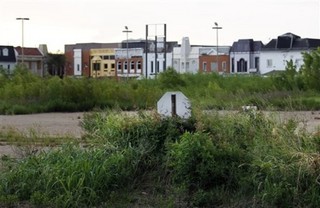The human world is fast becoming an urban world -- and according to many, the faster that happens and the bigger the cities get, the better off we all will be. The old suburban model, with families enjoying their own space in detached houses, is increasingly behind us; we're heading toward heavier reliance on public transit, greater density, and far less personal space. Global cities, even colossal ones like Mumbai and Mexico City, represent our cosmopolitan future, we're now told; they will be nerve centers of international commerce and technological innovation just like the great metropolises of the past -- only with the Internet and smart phones.
According to Columbia University's Saskia Sassen, megacities will inevitably occupy what Vladimir Lenin called the "commanding heights" of the global economy, though instead of making things they'll apparently be specializing in high-end "producer services" -- advertising, law, accounting, and so forth -- for worldwide clients. Other scholars, such as Harvard University's Edward Glaeser, envision universities helping to power the new "skilled city," where high wages and social amenities attract enough talent to enable even higher-cost urban meccas to compete.
Read Full Article »






